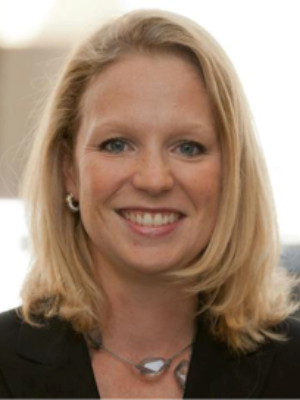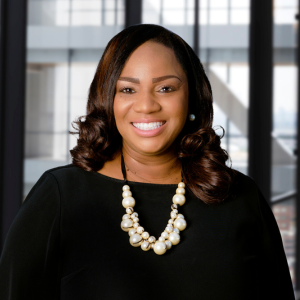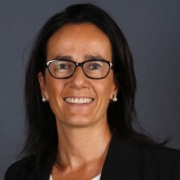Alison Hoover: Partner, Banking Transformation Leader and Advisory Diversity & Inclusion Leader, PwC U.S.
 “It took a long time to shake imposter syndrome. I’ve shifted my perspective now to believe that being a woman is an asset,” says Alison (Alie) Hoover. “It’s not just this sideline thing. It’s as much part of who I am, the same thing as being smart or outspoken.”
“It took a long time to shake imposter syndrome. I’ve shifted my perspective now to believe that being a woman is an asset,” says Alison (Alie) Hoover. “It’s not just this sideline thing. It’s as much part of who I am, the same thing as being smart or outspoken.”
Hoover talks about going part-time after motherhood, growing her leadership confidence and how she is approaching diversity by championing the upside.
Braving the Part-Time Conversation
Four years into consulting, Hoover went on for her MBA at Kellogg School of Management. She joined Diamond Technology Partners, the hot tech boutique, after and continued on with PwC, when Diamond was acquired in 2010, where she is currently the banking transformation leader.
But her career almost ended abruptly after she had her first baby. Hoover returned to the office, after 12 weeks of leave, on a Monday morning in 2002. By Wednesday at 5pm, she had quit her job.
“I literally threw all of my stuff in the trash, all the notebooks and articles and old project folders.” And she recalls saying, “There’s no way I can do this. I have this baby. It’s impossible.”
After moving to Washington, D.C. to be near family, she decided on her daughter’s first birthday that she did want to work, but part-time. She decided to brave the conversation where she was a “known commodity.”
Hoover phoned a Diamond partner in Chicago and proposed to be their person on the ground in D.C., to help build the firm’s newly started public sector practice, at three days a week. Successful, she ended up being the first to pilot a part-time work arrangement.
For seven years, Hoover worked part-time, upgrading to four days a week once she became a director because “I felt like at three days a week, I could be an individual contributor. I didn’t feel like I could effectively manage other people.”
While still in her part-time stint, she had a second daughter and became a Partner at PwC.
“Honestly, if I hadn’t had the opportunity to work part-time, I don’t think I would be in consulting at all anymore,” she reflects. “Maybe I made partner a year or two later. I’ll never know, but the flip-side is I wouldn’t be here at all. I wouldn’t be sitting in a leadership position.”
Asking, Receiving Support and Valuing Yourself
“You have to ask for what you need and what you want,” Hoover notes. “No one’s going to be mind reading that you need it and give it to you. Sometimes, you have to lay these things out.”
Hoover not only had to ask for part-time, she also had to train her teammates to consider when she was available and not. It also helped that her husband is a huge supporter of her and has been an active co-parent, and she notes that having people around her—a husband, parents, colleagues, partners—that believed in her, maybe even more than she believed in herself, mattered.
Her bosses even reflected to her that she could work at 80% and still get as much done as others, so she didn’t need to sweat the clock.
When she made partner, Hoover remembers a PwC leader advised her: “’You are a partner now. Work when you want to work. Do the work that you need to do, and don’t worry about the rest.’”
Hoover had to get past the hesitation of asking for support from others by reminding herself of the value she added, and that giving and receiving support were more than reciprocal.
“When you’re giving it, it’s what you’re supposed to do, it’s your job,” she comments. “When you’re asking for it, somehow it feels like a favor. I think that’s how we’re wired.”
Stepping Up To a Leadership Mindset
Prior to becoming a partner, Hoover remembers wondering aloud where the senior women were to support her. Someone in the room called out: “You’re a director, you’re pretty senior now. Who are you turning around and reaching to?”
It was a teachable moment.
“I realized that I had been so self-focused, wondering where the help was above me, that I hadn’t considered that someone might actually be looking to me to help them,” admits Hoover. “There’s the little factor of that voice, ‘Who am I to help anybody else?’”
Hoover realized that even if you still have your own learning curves or insecurities, others are taken their cues from you as a leader. You have accrued guidance to give to others.
“What you realize, more and more, and especially as a partner, is that while you might feel like the same person in your own head,” she says, “your positional authority and tenure creates an obligation, and there is something valuable you have to share.”
When appointed to lead the banking transformation team, Hoover was tasked with leading more senior and more experienced partners. Initially, she stepped tentatively into the role, until a boss pulled her aside and reiterated she had been chosen for a reason.
“Sometimes we all need that kick. It gave me more confidence,” she recalls. “He was giving me permission, in fact a mandate, to lead these other partners.”
“So much of consulting is built on expertise and knowing the most about a given topic, but there’s so much about leadership that is not just about knowledge but behaviors and other skills,” Hoover notes. “That was a mind shift for me, that I didn’t have to know everything about everything to lead other people.”
She prides herself on her integrity of word, ability to get things done and adeptness in leveraging her network for other people’s benefits.
“I think one of my biggest and best skills is being that connector who is bringing things together, connecting ideas and people, to help them advance whatever their agenda may be,” she says.
Affirming A Culture of Inclusion
“As one of the fewer women leaders, I feel a great responsibility to be present and accessible and visible,” says Hoover, noting it’s a personal choice, as often the responsibility for showing up for diversity falls too much on the shoulders of the under-represented.
Hoover is also PwC’s U.S. Advisory Diversity & Inclusion leader, and she falls into stride when talking on D&I. Having significantly less than 50% women in the partnership ring (PwC transparently publishes their diversity report) is one priority.
“My focus is twofold. There’s the very public, very visible things like representation. Who are we hiring? Who are we promoting? Who are leaders?” says Hoover. “But I think so much of those outputs is the result of the small, everyday decisions that the majority, for the most part, are making. Who gets staffed on a project? Who gets called on in a meeting? Who makes the dinner reservations? Who talks first? Who gets the chair at the head of the table? Whose e-mail are you responding to first?”
Hoover threads that conversation across conversations and decisions—suspecting those “everyday nudges help to tweak behaviors that over time add up to massive impact. “
“It’s often much more who are you helping versus who are you hurting, because I think 99% of the time, people are not intentionally discriminating,” she pinpoints. “How do we harness the good intentions of our leaders to create a more inclusive culture on a regular basis, and change all of the things that people unconsciously do that are not increasing inclusion? A lot of what I’m very focused on is subtler culture dynamics. Like, what does it feel like to go to work every day? How much do you believe in your ability to succeed and to make an impact?”
She indicates that her approach to that conversation is to positively reinforce the inclusive-habits that leads to organizational wins—more “carrot” than “stick”.
“How do we tell those stories where people are actually doing better or winning because of their inclusive behavior? Every time we get that note from a client impressed at the number of women present and speaking in the session,” she says, “I want to celebrate the successes, advancements, achievements and accomplishments.”
As well as accountability metrics, Hoover emphasizes the importance of top leadership in driving cultural change.
“I think everyone’s looking for that silver bullet around implementation, and cultural change is always a challenge, regardless of what element of culture you’re trying to change,” observes Hoover. “But those key decisions—tone at the top, who are your leaders, who and what you’re celebrating, transparency—go a long way.”
Outside of work, Hoover loves to cook homemade meals, spend time with her 15 and 18 year old daughters, keep up with politics and enjoy the outdoors as much as she possibly can.
By Aimee Hansen









